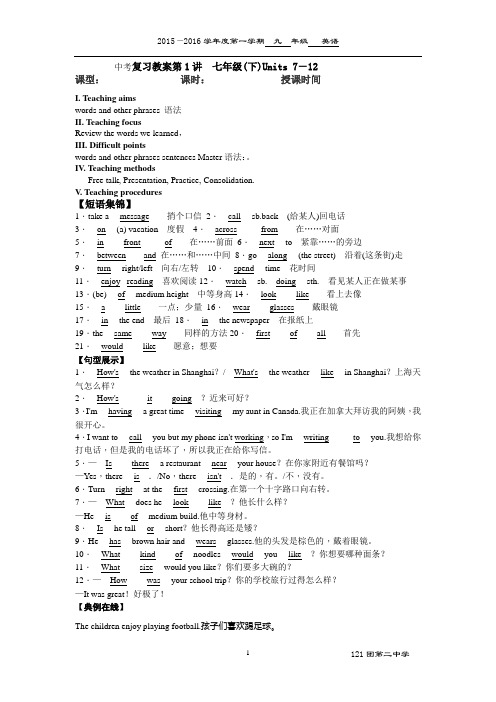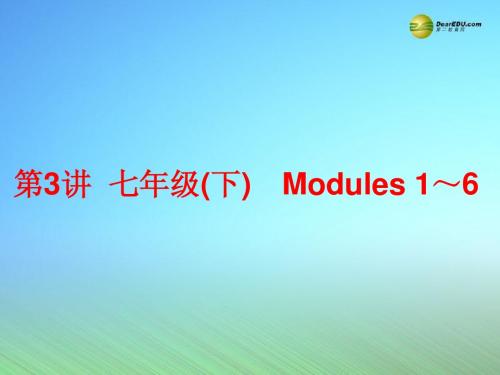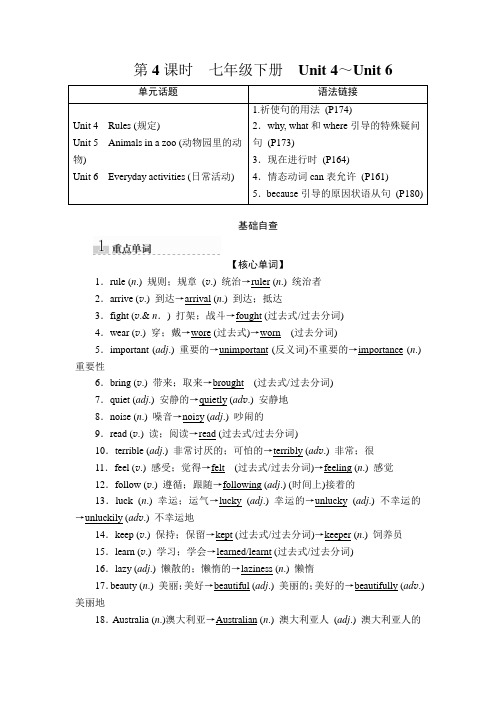【中考备战策略】2014年中考英语总复习 第一部分 夯实基础 第4讲 七下 Modules 7-12课件 外研版
中考英语总复习 夯实基础 第4讲 七下 Modules 712课件 外研版

类别 重 点 词 汇 拓 展
新课标要求
23.visit(v.)→visitor(n.)游客;观光者 24.person(n.)→personal (adj.)个人的→ personality (n.)个性 25 . noise(n.) → noisy (adj.) 吵 闹 的 → noisily (adv.)吵闹地
【妙辨异同】 either, too 与 also
either too also
一般只用于否定句句末
常用于肯定句,一般位于句末,其前通常用逗号隔 开(偶尔可以不加)
一般用于肯定句,位于实义动词之前,be动词、助 动词、情态动词之后
If you don't go there, I won't go there either. 如果你不去那里,我也不去了。 She likes reading, too.她也喜欢看书。 He can also speak English.他也会说英语。
类别
重 点 词 汇 拓 展
新课标要求
14.success(n.)→successful (adj.)成功的 → successfully (adv.) 成 功 地 →succeed (v.)成功;做到 15.excite(v.) →exciting (adj.)激动人心 的→excited (adj.)激动的;兴奋的 16.relax(v.) →relaxing (adj.)令人放松 的→relaxed (adj.)(人)轻松的;自在的
【妙辨异同】 find out, find 与 look for
find 着重表示通过理解、分析、思考、询问等“弄清楚; out 查明”某个情况、事实等
find
意为“找到;发现”,强调“找”的结果,其宾语往 往是某个丢失的物或人
中考复习教案第4讲七年级下7-12

中考复习教案第1讲七年级(下)Units 7-12课型:课时:授课时间I. Teaching aimswords and other phrases 语法II. Teaching focusReview the words we learned,III. Difficult pointswords and other phrases sentences Master语法:。
IV. Teaching methodsFree talk, Presentation, Practice, Consolidation.V. Teaching procedures【短语集锦】1.take a __message__捎个口信2.__call__ sb.back(给某人)回电话3.__on__ (a) vacation度假4.__across___ __from__在……对面5.__in__ __front___ __of__在……前面6.__next__ to紧靠……的旁边7.__between____and_在……和……中间8.go __along__ (the street)沿着(这条街)走9.__turn__ right/left向右/左转10.__spend__ time花时间11.__enjoy _reading__喜欢阅读12.__watch__ sb.__doing__ sth.看见某人正在做某事13.(be) __of__ medium height中等身高14.__look__ __like__看上去像15.__a__ __little__一点;少量16.__wear__ __glasses__戴眼镜17.__in__ the end最后18.__in__ the newspaper在报纸上19.the __same__ __way__同样的方法20.__first__ __of__ __all__首先21.__would__ __like__愿意;想要【句型展示】1.__How's__ the weather in Shanghai?/__What's__ the weather __like__ in Shanghai?上海天气怎么样?2.__How's____ __it__ __going__?近来可好?3.I'm __having__ a great time __visiting__ my aunt in Canada.我正在加拿大拜访我的阿姨,我很开心。
【中考备战策略】2014年中考英语总复习 第一部分 夯实基础 第3讲 七下 Modules 1-6课件 外研版

8.Jim is often late for school and his teacher is angry. 9 . Sometimes Mei Ping plays football with his friends on Sundays. 10. Mike can dance very well . He's a good dancer.
类别 重 点 短 语 记 忆 1.
新课标要求 take photos 拍照
2.wait for 等待;等候 3.put on 穿上 4.get ready for 为„„准备好 5.sweep away 扫去
类别 重 点 短 语 记 忆
新课标要求 6. all the year round 一年到头 7. walk up 沿„„走;登上 8. look forward to 期待 9.go out 外出 10. be good at 擅长
【归纳拓展】 population的用法 (1)population常与定冠词the连用,作主语时,谓语动词 常用单数形式。 (2)当主语是表示“人口的百分之几、几分之几”时,谓 语动词用复数形式。
(3) 有时 population 可用作可数名词,其前可用不定冠词, 构成a population of...。 (4) 表示人口的 “ 多 ” 或 “ 少 ” ,不用 much 或 little ,而
考点训练
基础知识过关 一、词汇应用(10 分) (一)根据首字母或汉语意思写出下列单词(5 分) 1.What's the population of Shanghai? 2.Beijing is famous for many places of interest. 3.He loves to stay in a foreign(外国的) city.
中考英语(人教新目标)一轮复习方案第一部分 第4课时 七年级下册 Unit 4~Unit 6

第4课时七年级下册Unit 4~Unit 6单元话题语法链接Unit 4Rules (规定)Unit 5Animals in a zoo (动物园里的动物)Unit 6Everyday activities (日常活动)1.祈使句的用法(P174)2.why, what和where引导的特殊疑问句(P173)3.现在进行时(P164)4.情态动词can表允许(P161)5.because引导的原因状语从句(P180)基础自查【核心单词】1.rule (n.) 规则;规章(v.) 统治→ruler (n.) 统治者2.arrive (v.) 到达→arrival (n.) 到达;抵达3.fight (v.& n.) 打架;战斗→fought (过去式/过去分词)4.wear (v.) 穿;戴→wore (过去式)→worn (过去分词)5.important (adj.) 重要的→unimportant (反义词)不重要的→importance (n.) 重要性6.bring (v.) 带来;取来→brought (过去式/过去分词)7.quiet (adj.) 安静的→quietly (ad v.) 安静地8.noise (n.) 噪音→noisy (adj.) 吵闹的9.read (v.) 读;阅读→read (过去式/过去分词)10.terrible (adj.) 非常讨厌的;可怕的→terribly (ad v.) 非常;很11.feel (v.) 感受;觉得→felt (过去式/过去分词)→feeling (n.) 感觉12.follow (v.) 遵循;跟随→following (adj.) (时间上)接着的13.luck (n.) 幸运;运气→lucky (adj.) 幸运的→unlucky (adj.) 不幸运的→unluckily (ad v.) 不幸运地14.keep (v.) 保持;保留→kept (过去式/过去分词)→keeper (n.) 饲养员15.learn (v.) 学习;学会→learned/learnt (过去式/过去分词)16.lazy (adj.) 懒散的;懒惰的→laziness (n.) 懒惰17.beauty (n.) 美丽;美好→beautiful (adj.) 美丽的;美好的→beautifully (ad v.) 美丽地18.Australia (n.)澳大利亚→Australian (n.) 澳大利亚人(adj.) 澳大利亚人的19.south (adj.) 南方的(n.) 南;南方→southern (adj.) 南方的20.Africa (n.) 非洲→African (adj.) 非洲的;非洲人的(n.) 非洲人21.sleep (v.& n.) 睡觉→slept (过去式/过去分词)→asleep (adj.) 睡着的→sleepy (adj.) 困倦的22.friend (n.) 朋友→friendly (adj.) 友好的23.forget (v.) 忘记;遗忘→forgot (过去式)→forgotten (过去分词)24.danger (n.) 危险→dangerous (adj.) 危险的25.cut (v.) 砍;切→cut (过去式/过去分词)26.use (v.) 使用;运用→useful (adj.) 有用的→useless (adj.) 无用的27.drink (v.) 喝(n.) 饮料→drank (过去式)→drunk (过去分词)28.shop (v.)购物(n.)商店→shopping (现在分词)→shopped (过去式/过去分词)29.man (n.) 男人;人→men (pl.)30.America (n.) 美国→American (adj.) 美国的;美洲的(n.) 美国人;美洲人31.child (n.) 儿童→children (pl.)32.miss (v.) 怀念;思念;错过→missing (adj.) 缺少的;丢失的【背记单词】动物植物1.panda (n.) 熊猫2.zoo (n.) 动物园3.tiger (n.) 老虎4.elephant (n.) 大象5.lion (n.) 狮子6.giraffe (n.) 长颈鹿7.animal (n.) 动物8.pet (n.) 宠物9.cat (n.) 猫10.tree (n.) 树修饰语1.sorry (adj.) 抱歉的;难过的;惋惜的2.dirty (adj.) 脏的3.cute (adj.) 可爱的;机灵的4.smart (adj.) 聪明的5.shy (adj.) 羞怯的;腼腆的6.any (adj.) 任何的;任一的(pron.) 任何;任一7.other (adj.) 另外的;其他的(pron.) 另外的人(或物) 8.young (adj.) 幼小的;年轻的9.delicious (adj.) 可口的;美味的行为动词1.practice (v.) 练习2.remember (v.) 记住;记起3.wish (v.) 希望4.save (v.) 救;救助5.kill (v.) 杀死;弄死6.wash (v.) 洗7.study (v.) 学习;研究地点1.place (n.) 地点;位置2.house (n.) 房子3.pool (n.) 游泳池;水池4.supermarket (n.) 超市介副词1.outside (ad v.) 在外面2.before (prep.) 在……以前(ad v.) 以前3.over (prep.) 超过,多于;在……上方4.just (ad v.) 只是;恰好其他1.hair (n.) 头发;毛发2.flag (n.) 旗;旗帜3.tomorrow (ad v.) 在明天(n.) 明天;未来4.race (n.) 竞赛5.state (n.) 州1.go_out 外出(娱乐)2.go_to_the_movies 去电影院3.get_lost 迷路4.drink_tea 喝茶5.make_rules 制定规则6.make_one's_bed 铺床7.be_strict_(with_sb.) (对某人)要求严格8.be_late_for 迟到9.in_class 在课堂上10.go_to_bed 上床睡觉11.think_about 考虑12.have_to 必须;不得不13.good_luck 好运14.be_from/come_from 来自……15.kind_of 稍微;有点儿16.be in (great) danger 处于(极大)危险之中17.talk on the phone 在电话上交谈18.do the dishes 清洗餐具19.eat out 出去吃饭20.do one's homework 做作业21.read a newspaper 看报纸22.follow the rules 遵守规则23.dining hall 餐厅24.cut down 砍倒25.(be) on time 准时26.listen to ... 听……27.(be) made of 由……制成的28.make soup 做汤29.living room 客厅30.South Africa 南非1.不要上课迟到,你一定要守时。
中考英语(人教新目标)一轮复习方案第一部分 第4课时 七年级下册 Unit 4~Unit 6

基础自查
考点汇聚
随堂演练
课后作业
9.in_class 在课堂上 10.go_to_bed 上床睡觉 11.think_about 考虑 12.have_to 必须;不得不 13.good_luck 好运 14.be_from/come_from 来自…… 15.kind_of 稍微;有点儿 16.be in (great) danger 处于(极大)危险之中
基础自查
考点汇聚
随堂演练
课后作业
5.人们砍倒许多树因此大象正在失去它们的家园。 People ________ ________ many trees so ________ are ________ their homes.
答案:cut down; elephants; losing
基础自查
考点汇聚
随堂演练
课后作业
谈论规矩 1.—____________________________________________________? (他必须在学校穿校服吗?) —Yes, he does./No, he doesn't.
答案:Does he have to wear a uniform at school
基础自查
考点汇聚
随堂演练
课后作业
其他 1.hair (n.) 头发;毛发 2.flag (n.) 旗;旗帜 3.tomorrow (adv.) 在明天 (n.) 明天;未来 4.race (n.) 竞赛 5.state (n.) 州
基础自查
考点汇聚
随堂演练
课后作业
1.go_out 外出(娱乐) 2.go_to_the_movies 去电影院 3.get_lost 迷路 4.drink_tea 喝茶 5.make_rules 制定规则 6.make_one's_bed 铺床 7.be_strict_(with_sb.) (对某人)要求严格 8.be_late_for 迟到
2024年人教版中考英语总复习第一部分知识点梳理七年级(下)Units 1-4

教教材材词词汇汇分分层层训训练练
熟词生义
名师考点精讲
安徽中考真题精选 -6-
七年级(下)Units 1-4
39. outside adv.在外面 adj.外面的
重 40. uniform n.校服;制服
点 41. practice v.练习 n.练习;实践
单 词 默
42. 43.
dirty adj.脏的 kitchen n.厨房
homeless adj.无家可归的
教教材材词词汇汇分分层层训训练练
熟词生义
名师考点精讲
安徽中考真题精选 -10-
七年级(下)Units 1-4
重点单词拓展
10.make v.使成为;制造→ made (过去式/过去 分词)→ maker n.生产者;制订者 11.center n.中心;中央→ central adj.中心的; 主要的 12.teach v.教;讲授→ taught (过去式/过去分 词)→ teacher n.教师
写 44. strict adj.严格的;严厉的
45. remember v.记住;记起
教教材材词词汇汇分分层层训训练练
熟词生义
名师考点精讲
安徽中考真题精选 -7-
七年级(下)Units 1-4
重点单词拓展
1.sing v.唱歌→ sang (过去式)→ sung (过去 分词)→ singer n.歌手 2.swim v.& n.游泳→ swam (过去式)→ swu_m (过去分词)→ swimming n.游泳;游泳运动 3.dance v.跳舞 n.舞蹈→ dancer n.舞者
31. between prep.介于……之间
教教材材词词汇汇分分层层训训练练
2014年中考英语复习总结七年级英语下册Unit-4-I-want-to-be-an-actor

Shop assistant Doctor
Ask and answer:
Actor
Reporter Policeman
-----What do you /they/we do ?
Waiter Bank clerk Student
I am a …
We/ They are…
Cook
Business man
Thanks !
He is a policeman.
What does she do?
She is a
policewoman.
What does she do?
She is a reporter.
What do they do?
They are
shop assistants.
What does he do?
Unit 4 I want to be
an actor
Ally March,2005
cook
farmer
businessman
worker
doctor
nurse
bank clerk
waiter waitress
lawyer
shop assistant
policeman
cook farmer
He wants to be…
a policeman
What does Yao Ming want to be?
He also wants to be…
a reporter
What does Anna’s mother do? She’s a bank clerk.
What does Anna’s mother want to be? She wants to be a policewoman.
2014年中考英语七年级下册复习正式版

类别
重 点 词 汇 拓 展
新课标要求 11.danger(n.)→dangerous (adj.)危险的 12.child(n.)→children (pl.)孩子们 13.sun(n.)→sunny (adj.)晴朗的 14.weather(n.)→whether (同音词 conj.) 是否 15.surprise(v.)→surprised (adj.)感到惊 讶的→surprising (adj.)令人惊奇的
15.work as 做……(工作) 重 16.wait for 等候;等待 点 17.on vacation 在度假;在假期中 短 18.take a photo 拍照 语 19.have a good time 玩得高兴;过得快乐 记 20.look for 寻找;寻求 忆 21.talk about 谈论;讨论;议论
7.on the right 在右边
8.take a walk 散步 重
9.have fun 玩得开心 点
10.the way to 去……的路 短
11.have a good trip 旅途愉快 语
12.kind of 有几分 记
13.at night 在夜里;在晚上 忆
14.work hard 努力工作
类别 重 点 词 汇 拓 展
新课标要求
16.everyone(pron.)→everybody (同义词 pron.)每个人→nobody (反义词 pron.)没 有人;没人 17.follow(v.)→following (adj.)下列的; 下述的
1. be from=come from 来自…… 重 2.across from 在……对面 点 3.next to 紧靠……的旁边;贴近;最接 短近 语 4.between... and...在……和……之间 记 5.in front of 在……前面 忆 6.turn left 向左拐
中考英语第一部分系统复习成绩基石七下第4讲

singing!
3.Everyone should do something to protect animals(动物)in danger. 4.Do you have a good sleep(睡觉)every night? 5.Andy is my new friend.He is very friendly(友好(yǒuhǎo)的). 6.The girl is only 8 years old,but she has saved(救)her mother’s life twice. 7.I shopped(购物)with my friends for a long time yesterday.
some...others...一
些……,另一些……
Some people came by car, others came by bus.A few came on foot.一些人 开车,另一些人 乘公交车,几个 人步行。
the others
2021/12/10
其余的(人 或物)
to指 部 常 se些 其htoe…一 分 用 他hmoeeto…个 后 结 的r.ht+.eh, …整 的 构.re复os另r…体 其 :t.s数h.一=中 余e.一名r些t除 全sh词.…e去部.,.…一。th,Tstceo有他hthltea六的ueahrrdseee个学esrnrs?at学生torhso教ee生呢mi.sn室,?Wihx里其er
in the bag.
15.People all over the world still(仍然)enjoy his music very
中考英语总复习第一部分系统复习成绩基石七下第4讲Unit4_6课件

Lisa reached her home very
reach 及物动词,reach+地方 late last night.莉萨昨天晚
上很晚才到家。
考点2 辨析bring,take和carry
Can we bring music players to school?我们可以把音乐播 放器带进学校吗? Unit 4 P20
Ⅱ.单项填空 7.There are lots of people talking in the room.It’s very B . A.new B.noisy C.big D.dirty
8.—Dale,don’t always D that old jacket.It looks
terrible.
11.[2017·郯城一模]I lost my backpack yesterday. C ,
my classmates found it and returned it to me.
A.Sadly
B.Unluckily
C.Luckily
D.Firstly
12.[2016·莒南一模]—How is your head teacher? —Our head teacher is B with us and I usually feel nervous in his lesson. A.kind B.strict C.pleased D.soft
I took my umbrella with me but it didn’t rain.我带了伞, 但没有下雨。
用手或身体 搬运
不强调动作的方向。She carried her baby 表示“捧,抱,提,in her arms.她怀里抱 运,携带”等 着她的孩子。
2014年中考英语复习七年级英语下册Unit 4

Unit 4 I want to be an actor. Section A
Section A
教学目标
1.学会谈论自己与他人的职业 2.学会谈论自己或他人将来想
从事的职业并陈述原因
Look and Learn
下一页
Explanation
—What do you do? --What do you do?
-What does he/she do? -He/She is a …
actor
-What does he/she do? -He/She is a …
singer
a thief( thieves )
-What does he/she do? -He/She is a …
reporter
TV station
-What does he/she do? -He/She is a …
Police Station
policeman (policemen)
-Where does he/she work? -He/She works in …
-What does they do? -They are …
policewoman policewomen
-What does he/she do? -He/She is a …
manager
teacher waiter singer reporter writer runner worker driver leader officer manager actor
student doctor nurse policeman (policemen) policewoman (policewomen) compere coach cook pilot bank clerk shop assistant waitress businessman businesswoman
- 1、下载文档前请自行甄别文档内容的完整性,平台不提供额外的编辑、内容补充、找答案等附加服务。
- 2、"仅部分预览"的文档,不可在线预览部分如存在完整性等问题,可反馈申请退款(可完整预览的文档不适用该条件!)。
- 3、如文档侵犯您的权益,请联系客服反馈,我们会尽快为您处理(人工客服工作时间:9:00-18:30)。
他们对我很友好。
—How do you like the story?
你觉得这个故事怎么样?
—I like it very much,though it's a little scary.
我很喜欢,尽管它有点恐怖。
【温馨提示】
What do you like about...?意为“你喜欢……的哪一方
重 点 句 型 整 理
3. At twentyeight he moved to London and joined a theatre company.在二十八 岁时他搬到了伦敦并加入了一个戏剧公 司。 4. How long did you spend there? 你在那里待了多长时间?
1.She was very friendly.她非常友好。(Module 8) 【考点透析】 friendly adj. “友好的”,常用于短语 be friendly with sb.“与某人友好相处”。 Our English teacher is friendly with us. 我们的英语老师与我们相处很友好。
某一天的上午、下午、晚上连用。
It happened on Monday morning.
这件事发生在星期一上午。
【妙辨异同】 at,on与in
三者都是表示时间的介词。
at 多用于具体的钟点 时刻前。 I usually get up at 5:30. 我通常在5:30起床。
on
主要用在星期几, The story happened on a 具体的某一天或具 hot afternoon.这个故事发 体一天的上午、下 生在一个炎热的下午。 午、晚上或节日前。
面?”
—What do you think of Xi'an?
你觉得西安怎么样?
—It's really a place of interest.
那真是个旅游胜地。
—So what do you like about it?
你喜欢它的哪些方面?
—Friendly people and delicious snacks. 友善的人们,可口的小吃。
类别 重 点 词 汇 拓 展 (n.)女演员
新课标要求 13. act(v.)→ actor (n .)(男 )演员→ actress 14. write(v.)→ writer (n.)作家 15. success(n.)→ succeed (v.)成功 → successful (adj.)成功的→ successfully (adv.)成功地 16. nation(n.)→ national (adj.)民族的; 国家的
12.again and again 再三;反复„„ 13.go away 走开;离开 14.at the age of 在„„岁时
重 点 句 型 整 理 1. She was very friendly.她非常友好。 2.He was born on 18th July,1918. 他出生于 1918 年 7 月 18 日。
第4讲 七年级(下) Modules 7~12
类别 重 点 词 汇 拓 展 1.
新课标要求 crowd(v.)→crowded (adj.)拥挤的 2.far(adj.)→farther (比较级)→farthest (最高级) 3.good & well(adj.)→better (比较 级)→best (最高级) 4.much & many(adj.)→more (比较 级)→most (最高级)
5.How long did you spend there?
你在那里待了多长时间?(Module 12)
【考点透析】 spend 花费(时间、金钱)
I spent 10 yuan on the book.
这本书花了我十元钱。
【妙辨异同】 spend,take,pay与cost 这四个词都有“花费”之意,但用法不同。
类别 重 点 词 汇 拓 展
新课标要求 5. found(v.)→ founder (n.)创建者 6. science(n.)→ scientist (n.)科学家 7. friend(n.)→ friendship (n.)友谊 → friendly (adj.)友好的→ unfriendly (反 义词 adj.)不友好的 8. post(v.)→ poster (n .)招贴画;海报
类别 重 点 词 汇 拓 展
新课标要求 17. fly(v.)→ flight (n.)飞行;航程 18. safe(adj.)→ safely (adv.)安全地 → dangerous (反义词 adj.)危险的 19. three(num.)→ third (num.)第三 20. mean(v.)→ meaning (n.)意义;意思
我每天花1小时锻炼。
I paid 20 yuan for the book. 我买这本书花了二十元钱。 The pen cost me 10 yuan.
这支钢笔花了我十元钱。
考点训练
基础知识过关 一、词汇应用(10 分) (一)根据句意及首字母提示写出下列单词(5 分) 1.My father is always strict with me in my study. 2.It's not far from our school. I can walk there. 3.In 1994, Mary married Tom and they are very happy.
I took part in the football match yesterday afternoon.
我参加了昨天下午的足球比赛。
4.What did you think of the film about Zhan Tianyou on television last night?你觉得昨晚电视上播放的关于 詹天佑的那部电影怎么样?(Module 11)
类别 重 点 词 汇 拓 展
新课标要求 9. two(num.)→ second (num.)第二 10. gold(n.)→ golden (adj.)金黄色的 11. happy(adj.)→ unhappy (反义词 adj.) 不高兴的 12. sleep(v.)→ asleep (adj.)睡着的 → sleepy (adj.)困倦的
in
表示一段时间,用 于年、月、星期、 四季或泛指上午、 下午、晚上。
in 2014 在2014年 in August 在八月 in the morning 在上午
3. At twentyeight he moved to London and joined a
theatre company.在二十八岁时,他搬到了伦敦并加入了
9.At the beginning (begin) of this term, I made a plan to study English well. 10 . The students have to do their homework (homework) at late night.
二、句型转换(10 分) 1.I did_some_housework last weekend.(就画线部 分提问) What did you do last weekend? 2.We had a good time at David's birthday party yesterday.(改为否定句) We didn't have a good time at David's birthday party yesterday.
3. I went shopping yesterday but I didn't buy anything.(改为同义句) I went shopping yesterday but I bought nothing . 4 . All of us joined in the sports meeting last Monday.(改为同义句) All of us took part in the sports meeting last Monday. 5.I spent half an hour finishing my homework.(改 为同义句) It took me half an hour to finish my homework.
It took me half an hour to do my homework. 做作业花费了我半个小时。 She spent a lot of money on her new clothes.
她花了大量的钱在新衣服上。
I spend an hour (in) exercising every day.
【考点透析】 What do you think of...?是一种常用句式,
意为“你觉得 …… 怎么样?”,可替换为 How do you
like...?常用于询问别人对某人/某事的看法。
—What do you think of your new classmates? 你觉得你的新同学怎样? —They're really friendly to me.
三、根据汉语意思完成句子(10 分) 1.你觉得这个现代化机器怎么样? What do you think岁读完中学。 He left school at the age of eighteen .
3.贝蒂决定回她的故乡。 Betty decided to go back to her hometown. 4.当他听到这个消息时,他急忙赶往医院。 He hurried to the hospital when he heard the news. 5.你什么时候,在哪里出生的? When and where were you born?
